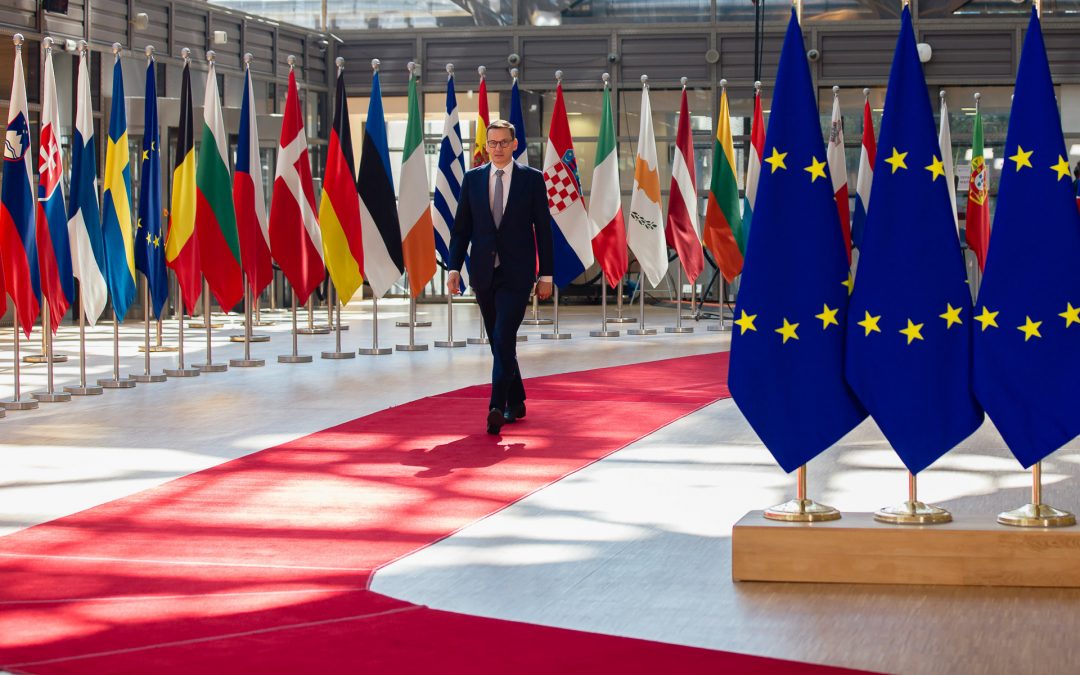By Aleks Szczerbiak
By boosting Poland’s international standing and reducing the credibility of the main EU powers on security issues, the war in Ukraine has opened up a range of possibilities for Warsaw’s right-wing government to increase its influence and reshape the current system of European alliances.
However, relations with Hungary, its previous main EU ally, have reached an all-time low, and it is unclear to what extent other post-communist states will follow Poland in breaking with the European “mainstream”.
“Own stream” not the “mainstream”
Poland’s right-wing Law and Justice (PiS) party took office in autumn 2015 with a commitment to reorientate the country’s foreign policy and adopt, as it saw it, a more robust and assertive approach to advancing the country’s national interests within the EU.
Its predecessor, led by the liberal-centrist Civic Platform (PO) – the country’s governing party between 2007 and 2015, and currently the main opposition grouping – tried to exert influence by locating Poland within the so-called European “mainstream”, developing close ties with the main EU powers, especially Germany.
PiS, on the other hand, argued that Poland needed to adopt a more autonomous EU policy and develop its ‘own stream’, building alternative power blocs as counterweights to the dominant Franco-German axis.
To achieve this, the PiS government tried to position Poland as a regional leader and develop a number of multi-lateral formats based on forging closer ties with the post-communist states of central and Eastern Europe.
One of these was the so-called Visegrad group: a forum involving Poland, the Czech Republic, Hungary and Slovakia, formed in 1991 to promote regional co-operation and accession to Western institutions which has, in recent years, become an increasingly visible EU lobby group.
Indeed, PiS developed particularly strong ties with Hungary’s ruling Fidesz party led by prime minister Viktor Orbán, which was, until recently, Warsaw’s closest EU ally. Another such forum was the Polish-led Three Seas Initiative, a wider group of twelve post-communist states aimed at developing solidarity and co-operation on issues where they had tangible common economic interests, such as infrastructure, technology and energy security.
Perhaps not surprisingly, PiS soon found itself in conflict with the EU political establishment, although the most serious clashes were actually over its domestic political reforms. The Polish government has been in a protracted stand-off with the European Commission and major EU powers over so-called rule of law issues, particularly its fiercely contested overhaul of the country’s judicial system.
The EU institutions agreed with criticisms levelled by Poland’s legal establishment and most opposition parties that these reforms undermined judicial independence and threatened the key democratic principle of the constitutional separation of powers.
PiS, on the other hand, argued that, following Poland’s flawed transition to democracy in 1989, the judiciary, like many key institutions, was expropriated by an extremely well-entrenched, and often deeply corrupt, post-communist elite. It accused the EU institutions of bias and double standards arguing that the Polish reforms were in line with practices that existed in other established democracies.
It said that the EU political establishment was using the rule of law issue as a pretext to victimise PiS because the party rejected the EU’s liberal-left consensus on moral-cultural issues which it felt undermined Poland’s traditional values and national identity.
Indeed, PiS argued that the conflict arose precisely because it had adopted a more assertive approach to defending and advancing Polish interests and values within the EU.
Poland’s increased international standing
So how has the Russian invasion of Ukraine affected PiS’s EU strategy? Poland’s centrality to the West’s response has provided Warsaw with an opportunity to raise its diplomatic and military profile as a key regional player.
Its critical geographical location, together with the fact that it is NATO’s largest member and top defence spender in the region, mean that Poland has become pivotal to the alliance’s security relationship with Moscow. It has been one of the main hubs for channeling military and humanitarian aid to Ukraine, and prime destination for refugees fleeing from the conflict, with more than 3 million people crossing its Eastern border.
The war has also dramatically changed Europe’s geopolitical security dynamics, and potentially the balance of power within the EU bloc. The main EU powers, especially Germany, disregarded the interests of their central and East European allies by developing close ties with Russia; becoming dependent on Russian oil and gas and supplying Moscow with critical technology in the (as it turned out naïve) hope of drawing it into the West’s civilisational orbit.
Resentment within the post-communist states over what they see as the West European powers’ over-conciliatory approach to the Kremlin – and, following the outbreak of armed conflict, apparent reluctance to take the lead in countering Russia – meant that, as international security became the dominant issue in the region, the EU political establishment lost considerable political and diplomatic capital.
At the same time, Poland’s credibility and international standing were enhanced by the fact that it had, for a long time, warned about Russian President Vladimir Putin’s expansionist designs on the region.
Warsaw had criticised Germany and other Western powers for developing economic and diplomatic ties with Moscow over the heads of the post-communist states, exemplified by the controversial Nord Stream 2 gas pipeline, which runs directly from Russia to Germany across the bed of the Baltic Sea bypassing Poland and Ukraine (and which Berlin belatedly suspended).
Poland has been one of Ukraine’s staunchest allies, at the forefront of efforts to persuade the Western international community to develop a common, robust response to the Russian invasion and ensure that sanctions are maintained and extended.
The fact that Germany and the main EU powers have lost credibility on the security issue at a time when it has moved to the top of the political agenda, potentially makes other post-communist states more receptive to Poland’s ideas of closer regional co-operation as a counter to the EU political establishment.
Previously, most of these countries saw locating themselves within the European “mainstream” and working closely with Berlin as the key to advancing their interests.
Rebuilding links with Washington
Moreover, as the war increased the salience of the security issue the USA pivoted away from its previous approach of mediating European relations primarily through the EU political establishment. When US President Joe Biden took office in 2021, he effectively sub-contracted European regional leadership to Berlin.
For example, although he initially signalled scepticism towards the Nord Stream 2 project, and declared repeatedly that his administration would continue to support making the post-communist states’ energy market less dependent on Russia, Biden did not follow through on a threat to sanction German companies involved in the pipeline’s construction.
At the same time, PiS had extremely fraught relations with the Biden administration. Poland’s ruling party enjoyed very strong ties with Biden’s predecessor, Donald Trump, whom it came to see as a conservative ideological soulmate. Trump gave strong support to the Three Seas Initiative, which he saw as a way of boosting Poland’s influence and challenging the existing EU elites.
The Biden administration, on the other hand, viewed PiS as being on the “wrong side of history” on moral-cultural issues, and during the 2020 US presidential election campaign Biden mentioned Poland as a country where democracy was endangered.
For his part, PiS-backed Polish President Andrzej Duda initially delayed acknowledging Biden’s election until the results were officially ratified. Biden also saw the role of European regional co-operation forums such as the Three Seas Initiative as complementary to the EU “mainstream” rather than a counterweight to the Franco-German axis.
In fact, even before the war began Duda had been making a concerted effort to rebuild links with Washington. Last December, he vetoed a controversial media law that the USA felt threatened the commercial interests of the American-owned Polish TVN broadcaster, which takes a strongly anti-PiS editorial line.
Moreover, following the invasion Poland became a key front-line NATO member and Washington’s most important strategic partner in promoting regional security and challenging Russian aggression.
With Germany lacking the authority to lead Europe on security issues, the Biden administration made a pragmatic decision to put aside its political and ideological differences with PiS and prioritise broader strategic co-operation; exemplified by Biden’s high-profile March visit to Poland when he tellingly did not overtly criticise the Polish government’s domestic policies.
Relations with Hungary at a low point
However, one clear political downside of the Russian invasion from PiS’s perspective is that top-level co-operation between the four Visegrad states has effectively been suspended due to Hungary’s stance of maintaining close relations with Moscow. Although some lower level of cooperation will probably continue, for the foreseeable future the group is unlikely to function as a coherent regional lobby organisation.
Moreover, PiS’s relations with the Orbán administration are at an absolute low point. Previously, the two governments had been close political and ideological allies, regularly supporting each other in their respective clashes with the EU political establishment over rule of law and moral-cultural issues.
However, while Poland has taken a strongly anti-Russian line, Hungary held up tougher EU sanctions and refused to allow weapons bound for Ukraine to transit through its territory. Contrary to PiS’s hopes and expectations, Orbán did not go further in distancing Budapest from Russia after Fidesz won Hungary’s April parliamentary election.
For sure, the two parties have long held divergent views on relations with Russia but, until the invasion, PiS was prepared to tolerate Fidesz’s pro-Moscow tendencies and put the issue on the back-burner. However, the war has been a game-changer, with PiS seeing Russian aggression in Ukraine as a defining moment in international politics and Budapest’s close links with Moscow as undermining not only Ukrainian but also Polish security interests.
For the moment, PiS’s previous, seemingly wide-ranging, strategic partnership with Fidesz, based on a shared anti-federalist view of their preferred trajectory of the European integration project and rejection of the liberal-left EU consensus on moral cultural issues, has been reduced to tactical co-operation over rule of law issues where both countries have been attempting to stave off EU sanctions.
Will regional security remain the dominant issue?
It is too early to tell to what extent the war will strengthen Poland’s efforts to draw other post-communist states away from their orientation towards Germany and the EU “mainstream”. The international situation is fluid and a lot obviously depends on how long and protracted the war will be, and whether it will have long-lasting or quickly diminishing effects.
Moreover, Germany remains the Union’s key political player and main economic powerhouse so, however frustrated they may be about Berlin’s indecisiveness over the Ukrainian conflict, central and East European states may still want to align themselves closely with the “mainstream”, particularly if security issues move down the political agenda and socio-economic concerns become more salient.
There is also an argument that deeper EU integration – and, therefore, closer alignment with the EU “mainstream” – may actually enhance these countries’ security by helping to embed them more firmly within Western international structures. The Polish opposition has, for example, argued that PiS’s conflict with the EU political establishment has undermined the country’s national security by weakening its anchoring in the West.
Nonetheless, to the extent that regional security remains the defining issue in central and East European politics, it is unlikely that there will be an imminent return to the status quo ante as far as German leadership credibility is concerned.
Although it is unclear how this will ultimately play out, the Russian invasion has clearly opened up a range of possibilities for PiS to boost its EU influence and reshape the current system of European alliances.
Main image credit: Krystian Maj/KPRM (under CC BY-NC-ND 2.0)





















